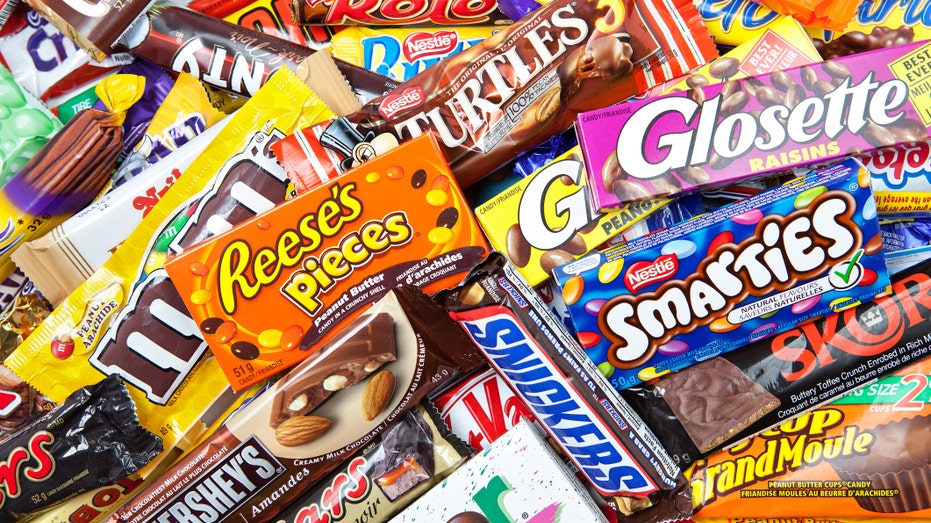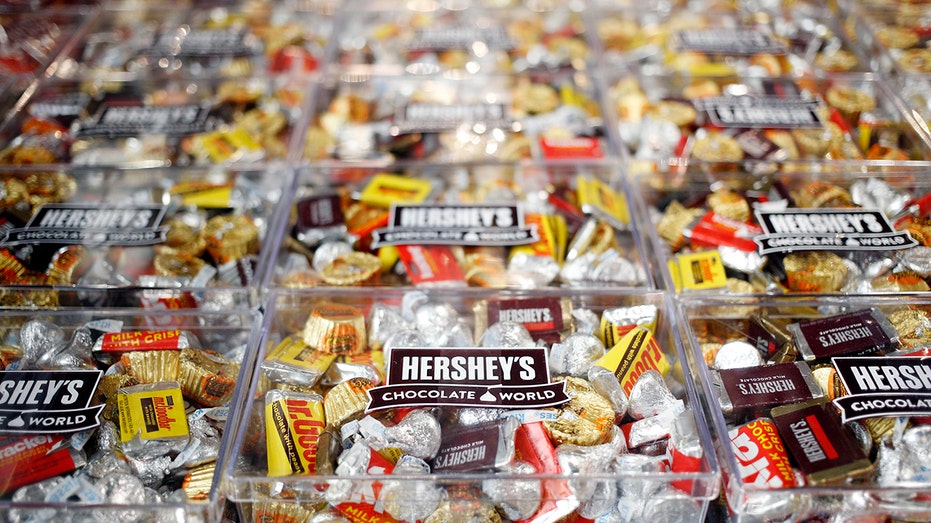Chocolate lovers are cutting back on sweet treat purchases amid rising prices
Oh fudge! Consumers are buying less chocolate today amid inflation
'Shrinkflation' hits consumers nationwide
David Lee Miller reports on often-unnoticed economic practice
Based on new data and remarks from executives at some of the world's biggest chocolate companies, consumers in both the U.S. and Europe are cutting back on chocolate purchases due to the items' rising prices.
Overall U.S. chocolate retail sales volumes have been "off and down" 2% to 3% over the last couple of months, as prices have risen in the "high single-digit, low double-digit" range, Melissa Poole, Hershey's vice president of investor relations, told Reuters.
Hershey's performance closely tracks the rest of the chocolate category, the wire service reported.
NYC PUB SELLS GALLON OF BEER FOR PRICE OF GAS TO PROTEST BIDEN INFLATION
"We are expecting that as we move through the year ... we will see a bit of pull-back in volume," Poole told Reuters.
Hershey previously noted that it was expecting a "softening" in demand.

A variety of chocolate products are shown, as made by various companies including Nestle, Hershey's, Mars Inc. and Cadbury.
But until the recent decrease, "consumers haven't really reduced consumption much at all."
In the later stages of the COVID-19 pandemic, chocolate sales ballooned — along with other consumer products — Reuters noted, with shoppers assisted by government stimulus payments as they maintained the stay-at-home habit of buying products and supplies in bulk.
OHIO MCDONALD'S FRANCHISE OWNER, A VETERAN, PAID WORKERS AMID CLOSURE: ‘I’VE BEEN IN THEIR SHOES'
But today, chocolate companies are seeing some consumer behavioral changes.
As just one example, shoppers are choosing individual candy bars at store checkouts — instead of buying larger quantities and multi-packs from grocery aisle shelves.

Hershey Co. miniature candies are displayed for sale inside the company's Chocolate World visitor center in Hershey, Pennsylvania. (Luke Sharrett/Bloomberg via Getty Images / Getty Images)
The volume sold of chocolate products in the U.S. dropped 1.5% versus a year ago in the 13 weeks ended June 12 as prices soared 8.2%, according to IRI, a Chicago-based market research firm that shared information with Reuters.
"We're going to see chocolate becoming more sensitive to price," Daniel Sadler, an IRI principal, told Reuters.
"For those who have the money and have the space to store bigger bags, value to them is cheaper price per pound."
"Consumers will treat themselves, but it will be smaller sizes — a small treat. That's why you're seeing [a sales] volume decline," he said.
In recent months, Hershey has been using a new fulfillment center in Annville, Pa., to more efficiently serve retailers such as mass discounters and dollar stores whose customers are sensitive to price, Poole indicated.
SOBERING NEW STUDY SAYS THAT THOSE UNDER AGE 40 SHOULDN'T DRINK ALCOHOL AT ALL
"For those who have the money and have the space to store bigger bags, value to them is cheaper price per pound," she said.
"Value to others might be something 'accessible to me' at an absolute lower price point."
Hershey in certain cases slims down its package size and keeps the same or very close price — commonly known as "shrinkflation" — to retain customers who say they only have $3 to spend on a bag of chocolate Kisses, rather than $5 or $6, Poole also told Reuters.
Shrinkflation, such as trading down to cheaper chocolate, impacts cocoa demand even if item sales volumes stay the same.
Chocolate makers originally expected cocoa demand to grow some 2.5% this year, but are now seeing growth of just 1% — and that could be followed by no growth next year if inflation persists and the Russia-Ukraine war continues, traders and experts say, according to Reuters.

"I can definitely see that people are cutting back on this type of purchase" right now amid inflation, said one New York man.
"We don't buy a lot of chocolate to begin with," one New York father of four, speaking about his family's household, told FOX Business.
"But I can definitely see that people are cutting back on this type of purchase simply because they have to, given today's rising prices."
BOB DYLAN'S HEAVEN'S DOOR SPIRITS INTRODUCES LIMITED-EDITION BOURBON
On Saturday, July 16, a pack of 18 Hershey's Milk Chocolate King Size Candy Bars was going for $25.38 (each bar is 2.6 ounces) at Sam's Club, according to its website.
Yet a single full-size Hershey's Milk Chocolate Candy Bar, at 1.55 ounces, was going for a mere $1.14 at Walmart (prices may vary).
GET FOX BUSINESS ON THE GO BY CLICKING HERE
Consumers indeed may be opting for smaller selections of sweet treats — easier on the wallet, to be sure, and without stripping the treat completely from the household — amid inflation rather than making their usual larger purchases.
Reuters contributed reporting to this article.




















